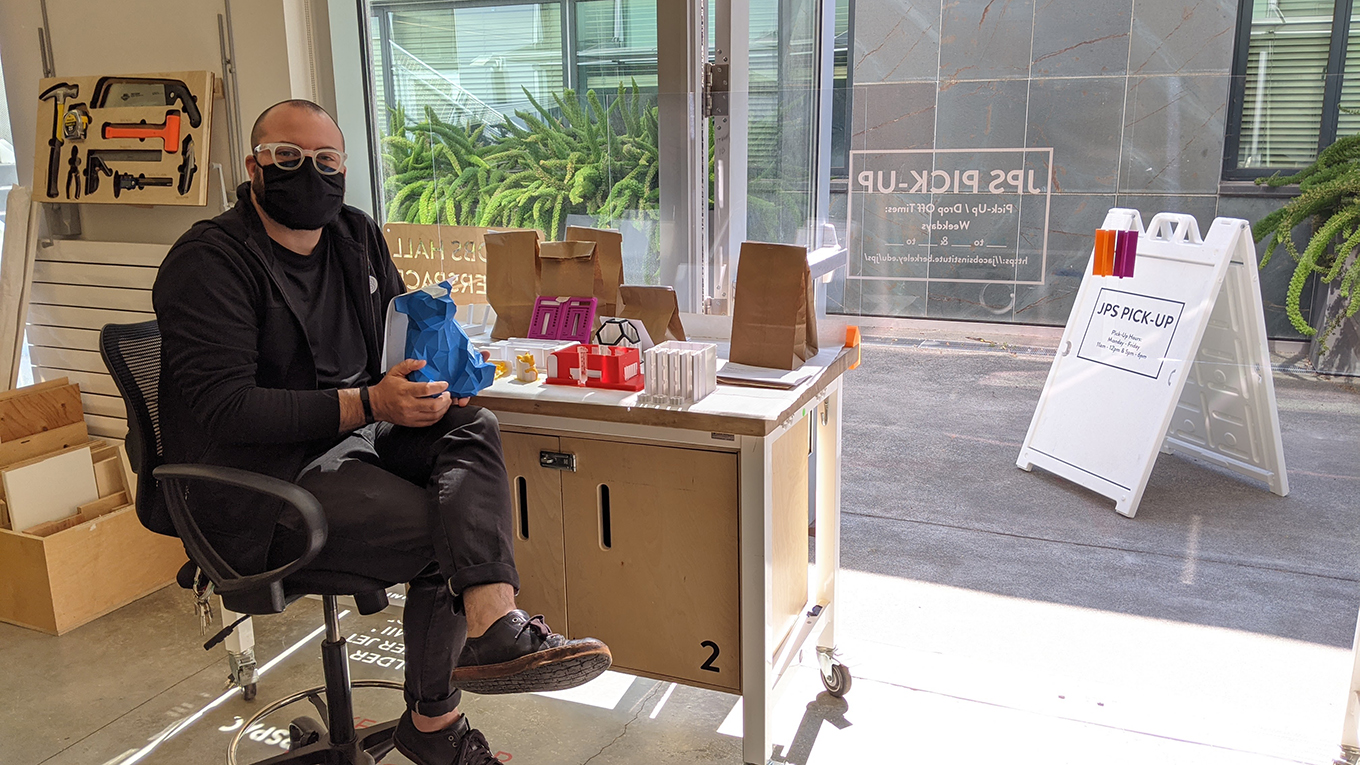 Cody Glen, design specialist and a member of the Jacobs Institute Project Support staff, helps with supply pick-ups.
Cody Glen, design specialist and a member of the Jacobs Institute Project Support staff, helps with supply pick-ups.Berkeley engineers win Extraordinary Teaching in Extraordinary Times Awards
The year 2020 was anything but normal for UC Berkeley teaching teams. But Berkeley Engineers always love a challenge: as the college quickly pivoted to teaching remotely, instructors and staff designed innovative approaches and worked outside of traditional roles to engage and support their students, challenging them to do meaningful work under unprecedented circumstances.
To recognize these efforts, the Academic Senate’s Committee on Teaching introduced the Extraordinary Teaching in Extraordinary Times Award, which attracted almost 500 nominations across campus. Among the award recipients were nine teaching groups within the College of Engineering, listed below.
After re-envisioning their teaching styles to accommodate COVID restrictions, most faculty and their instructional teams found that many of the new approaches improved upon traditional teaching methods and have vowed to keep many of the new methods in place.
Civil and Environmental Engineering
Tina Chow
Chow offered three workshops on remote instruction for her faculty colleagues to help them prepare for the fall 2020 semester and presented similar ideas to graduate student instructors through her pedagogy course. For her technical course, she prerecorded lectures, then used class time to engage with students. She also changed her grading scheme to make it more equitable and emphasize learning.
Electrical Engineering and Computer Sciences
Suraj Rampure and Allen Shen, with Philippe Boileau and Anna Nguyen of Epidemiology and Biostatistics
In the course Foundations of Data Science, this team maintained instructional excellence and enhanced student experiences by introducing new applications of course material. To offer their combined 800 students the richest experience possible, they restructured lecture materials to prioritize accessibility, designed assessments to enhance student learning and incorporated real-world examples to promote student engagement.
Gireeja Ranade, Gloria Tumushabe, Sumer Kohli, Neelesh Ramachandran, Austin Patel, Amanda Jackson, Anika Ramachandran, Moses Won, Dahlia Saba, Raghav Gupta, Panos Zarkos, Seiya Ono, Leyla Kabuli, Meghana Bharadwaj, Vidish Gupta, Jianshu Chi, Lily Bhattacharjee, Kristina Monakhova
Professor Ranade and her students understood that underrepresented students faced challenges finding the study group support that many others take for granted. They developed an automated, scalable and inclusive study group formation process to counteract some of these social challenges. In addition, they built several innovations into the class structure for EECS 16A to support these groups and adapted the class to online instruction through remote homework parties and group-based discussion sections that encouraged social interaction. By mailing lab kits, GSIs made it possible to do labs remotely, and also developed simulation-based labs that could be done entirely in software.
Ritika Shrivastava
As a staff member for EECS/BioE/MechE C106A/206A, undergraduate Shrivastava helped to boost student engagement with interactive presentations, developing new materials and overcoming technological differences by promoting inclusiveness.
Maxson Yang
Yang released a comprehensive student survey that guided course policy for spring and summer semesters. He reduced such common stressors as deadlines, increased face-to-face interactions through weekly check-ins and improved the virtual classroom experience through memes, music and more.
Jacobs Institute for Design Innovation
Joey Gottbrath, Cody Glen, Chris Parsell, Gary Gin, Adam Hutz, Nicole Panditi, Erik Sandall, Aleta Martinez
Courses in Jacobs Hall normally feature hands-on learning, mentorship and access to cutting-edge fabrication equipment. Recognizing that the lack of access to fabrication equipment and design staff mentorship would have a significant impact on learning and discovery, the team developed a remote project support service that allowed students, faculty and staff to submit formatted part files for fabrication and pick-up, as well as an automated print queue for 3D printers. They also offered ongoing online workshops and office hours, supporting more than 2,000 students in more than 40 classes through three semesters.
Mechanical Engineering
Hayden Taylor, Andrew Barkan, Sheila Caguiat, Tom Clark, Ana Preza-Gregg, Scott McCormick, Mike Neufer, Robert Jenkins
At its core, mechanical engineering is a fundamentally physical subject, so Taylor and his team recognized the need for a set of tools to enable remote instruction of hardware concepts. They spent summer 2020 designing a cost-effective collection of devices, tools and online resources they called the MicroKit, which has been deployed in multiple core courses with great success.
Sutardja Center and Industrial Engineering & Operations Research
Ikhlaq Sidhu
Data-X is an advanced project-based course for data science applications that combines a technical project with innovation training. To adapt to the remote environment, Sidhu flipped the classroom model with course content that was published online and made freely available. This created opportunities for students to work with collaborators around the world and provided guidance for the future development of innovation curriculum.
